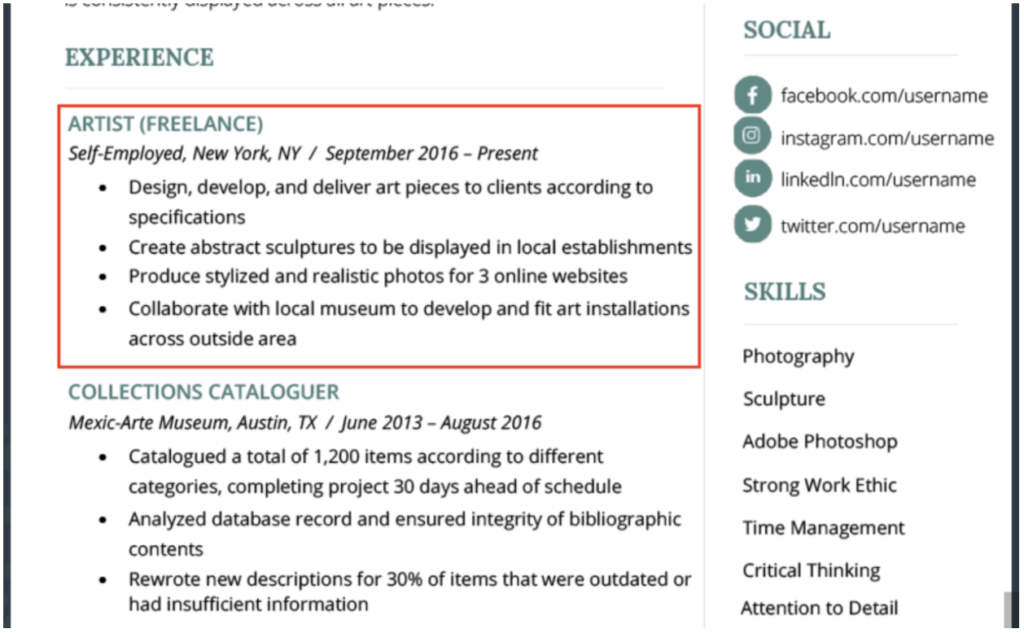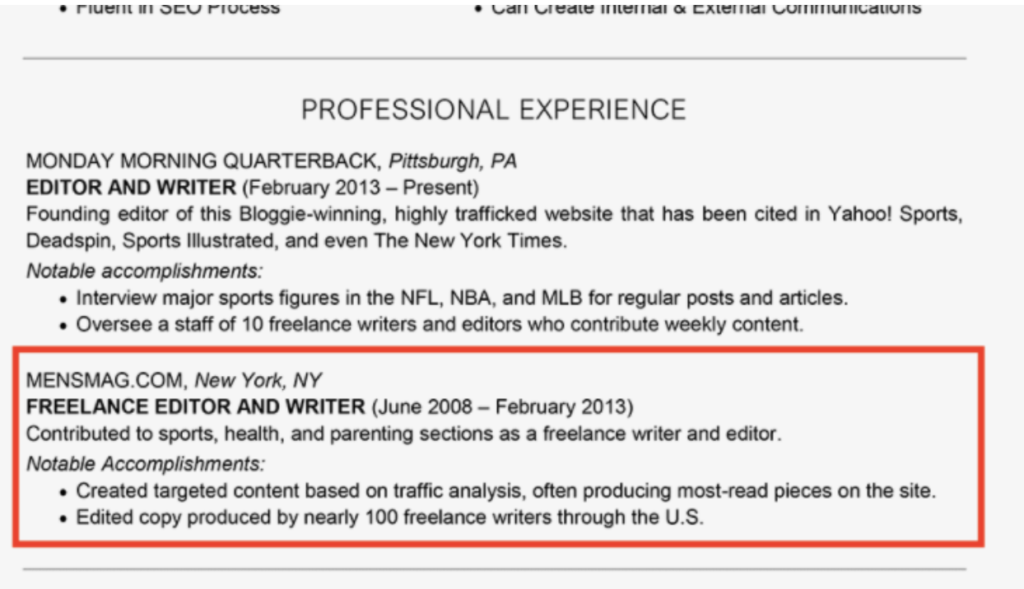

Quick Links
Quick Links
In this article, I’m going to be showing you the best ways to list freelance work on your resume. If you’re wanting to get more freelance work, you can apply to be a freelancer on FreeUp here!
Now, let’s get into it:
Incorporating freelance work on a resume can seem… well, complicated.
After all, just because you’ve been working for yourself doesn’t mean you haven’t been working. You know better than anyone else how qualified you are and how your freelance experience has helped mold your skills and talents.
But how do you mix in your freelance work with everything else on your resume? And is listing freelance work on a resume even necessary to land you your next position or freelance job?
In actuality, failing to include freelance work on your resume might actually jeopardize your chances of standing out.
Not every standard desk job can teach you the hustle, grit, independence, and self-discipline needed to be a successful freelancer and you want to let your future employer see that.
Easier said than done, right?
To help, I’ll explain why listing freelance work on your resume is a really great idea. And then I’ll break down what to include when listing freelance work in your resume and how to easily structure it to highlight what you’ve accomplished.
Why You Should Definitely List Freelance Work on Your Resume
Freelance work is work, right? You may have been self employed, but that doesn’t mean the work you’ve done is any less valuable, freelancing full time is not easy and it’s just as important to include your freelance work on your resume.
Plus, if you’ve been freelancing in-between jobs, listing your freelance work can show you didn’t have an actual gap in employment. Taking on freelance work in-between jobs shows employers the you…
- Have other marketable skills/talents
- Continued to apply your skills to make an income
- Are not the type of person who just waits around for the next opportunity, you create your own
- Work hard to continue to provide value to the world around you
- Know how to run your own business
Your resume should show chronological employment, and freelance work can help fill in those spaces on your resume.
If you’ve been freelancing on the side of your day job, listing freelance work shows that you take opportunities to grow outside of your position and that you put in extra work to gain more experience. You use your time both in and out of the office to excel professionally.
Now, all of these reasons probably resonate with you if you’ve been doing freelance jobs that are clearly relevant to your desired position.
But what if the freelance work you’ve been doing doesn’t necessarily fall in line with the work you’re hoping to obtain?
There is still immense value in the freelance work you’ve done regardless of the industry.
If the type of work you’ve done doesn’t seem to fit exactly in line with the job listing, try looking at your work through a different lens.
Consider the business side of your freelance work. What soft skills did you obtain or improve through your work? Showcasing what you were able to learn through your freelance work (even if the work itself wasn’t relevant) can score you major points on your resume.
What (and What Not) to Include on a Freelance Resume
Adding freelance work to your resume is slightly different from listing any other position. Your employer, after all, is yourself.
There are three common ways experts advise listing freelance jobs on your resume:
- Only include projects that you worked on for 3 months or more (in order to keep total line items on your resume to a minimum).
- Just list everything, making sure to lump together any small projects as one job listing (again, to save space).
- List every single thing you’ve worked on in detail (this takes up a lot of space, but shows you’ve done a lot of great work).
Our philosophy is that if it adds value to your resume, include it.
But sending a 10-page resumé to an employer is probably not a great idea.
So go ahead and group together smaller, less-significant projects if it makes sense, just be sure to leave space to let the notable work shine.
Once you’ve picked which work to showcase, your freelance listings should feature all relevant information including:
- clients you’ve worked for
- projects’ you’ve completed, and
- results you saw through your work.
This may all seem straightforward, but let us break down what to include in each category and what to leave out. Below, we’ll share some simple Dos and Don’ts for each piece of information.
Clients You’ve Worked For:
DO:
- List your client where you would normally list your employer.
- Include a brand name, organization, or individual—especially notable clients
- Add the geography of this client, if relevant
DON’T:
- Include confidential client information. Your future employer likely does not need this information anyway, and you run the risk of losing trust with that client.
- Include client contact information If a client doubles as a reference.
Projects You’ve Completed:
DO:
- Highlight the work you’ve done. List the projects and tasks you completed that would be most relevant to an employer.
- Describe the project in a clear understandable way so the reader can know exactly what you did.
- Highlight the skills you used to make these projects happen. (This is where you can start bragging.)
- Consider including a link to your freelance portfolio if you have one.
DON’T:
- Add unnecessarily elaborate language to make your project seem more important or exciting.
- List every single step or smaller project. It’s ok to summarize and group projects together to illustrate the big picture of what you’ve done.
Results You’ve Achieved for Clients:
DO:
- Demonstrate how the work you’ve done has contributed to the success of your client.
- Show how your work aided or helped in your clients mission and how you specifically made it happen.
- Use measurable outcomes to show what your work has done.
DON’T:
- Share how much you charged for your work
- Include mediocre results. Take this opportunity to only highlight the results you achieved for clients that really stand out.
Including freelance work on your resume gives you just another opportunity to promote yourself, include whatever relevant information that will do just that.
How to Structure Your Freelance Work Listing on a Resume
The “plug and play” model you’re used to when updating a traditional resume won’t exactly work for freelance work.
To show you what we mean, we’ve included examples to help illustrate how to feature your freelance work to look just as professional and impactful as other positions on your resume.
The Basics
Traditionally you’d list out each job this way: Employer, Title, Years Worked, Tasks/Success
Structure Example:
Bananas Inc., 2003-2008
Lead Copywriter
- Wrote all about bananas
- Saw 3000% increase in site clicks
- Grew online presence by 111.2%
When listing freelance work on your resume, however, you’ll want to change the structure to fit your freelance work. Try instead: Client name, Main Duties (copywriting, etc), Dates, Skills/Results
Structure Example:
Orange Haven 10/1/2019-12/30/2020
Freelance Marketing Copywriter
- Wrote content for all marketing material for Orange Slush campaign
- Increased client sales by 40000%
- Generated $700 B in Orange Slush Sales
Now let’s go through some real-life examples.
Real-World Examples of Listing Freelance Work on a Resumé
What better way is there to learn what (and what not) to do when listing freelance work on your resumé than to take a look at some actual examples from freelancers?
First, here’s an example that doesn’t quite work:
This resume tried to copy the same structure for their freelance work as their other positions which is close, but misses the mark in a few places.

Image Source
We’d remove the “self employed” section as it’s already implied when you add “freelance” in your description. They told us exactly what they did, but left out the impact and results of the work they did which would come across much stronger.
On the other hand, here’s an example that does work:
Alright, this reference to freelance work on a resume really works. Notice, you don’t immediately recognize that they’ve included freelance work at all, because instead of highlighting their work situation, they’ve featured their great experience.
We’d even argue this person could have left off “FREELANCE” from the job title and this would have been honest and powerful. Your job status doesn’t matter as much as the work that you completed and results you achieved.

Image Source
Instead of following the same structure for traditional positions they swapped out the traditional employer placement for the client name, referenced that they were in a contributing freelance position, and most importantly showcased what difference their work made to the client.
This feels relevant and impressive as opposed to just just filling up the space.
List Your Freelance Work on Your Resume… You’re Ready
It’s a no brainer.
Adding freelance work to your resume will only help an employer understand your value. With just a few tweaks you can incorporate your freelance work and stand out from other applicants and even grow your freelance clientele.
Follow the structure we mentioned above and consider what you’ve done for your client. You’ll be surprised how much value you’ll add by showing that you’ve not only worked for yourself, but you’ve been successful in doing it.
Not everyone can say that and it’s worth bragging about on a resumé.
Show off what you’ve done. Your freelance work only makes you that much more versatile as a future employee.


If you have a freelance website or portfolio, include a link to it on your resume. This will allow potential employers to see your work and learn more about your skills.